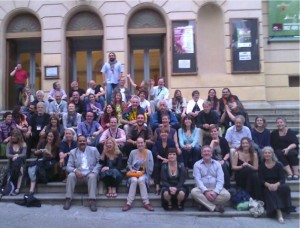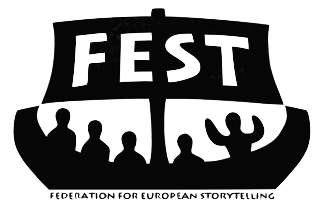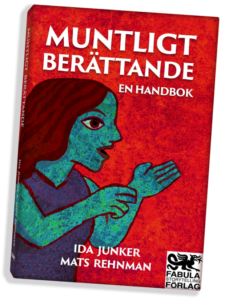Federation for European Storytelling, FEST, arrangerade årets konferens i Toledo, den 7 – 10 juni. Där deltog 25 Storytelling-organisationer från16 europeiska länder. Dessutom fanns observatörer Canada, Israel och Jordanien.
FEST startade sommaren 2008 i Oslo, då möttes flera europeiska berättare för att samtala om möjligheten att skapa ett europeiskt nätverk. Behov fanns av att utbyta erfarenheter och kunskaper när det gäller muntligt berättande, över landsgränserna. Då skapades namnet på organisationen, skissen på organisationsformen och planeringen för framtiden. Sedan dess har möten hållits i Lausanne (Schweiz) och i Reading (England).
Denna gång, den fjärde konferensen, i Toledo, i Spanien, var fokus på att få stadgarna klara, att skapa grunderna för en internationell organisation, samt att utbyta erfarenheter kring det mångspråkiga berättandet som konstform.
Där gjordes också klart vilka som ska sitta i den nya styrelsen, den består av: Guy Tilken (Belgien), Rose-Marie Lindfors (Sverige), Theresa Amoon (Frankrike), Paola Balbi (Italien) och Charo Pita (Spanien).
Och vi enades om att de kommande tre konferenserna ska hållas i : Alden Biesen, Belgien, 4 – 7 juli 2012. 2013. Rom, Italien 2013, samt Umeå, Sverige. 2014 (Umeå som då är kulturhuvudstad)
Denna gång startades dessutom ett samarbetsprojekt med utgångspunkt i 200 års jubileet av Bröderna Grimm´s första sagosamling 2012. På Facebook finns en grupp ”Storytelling” som Storytellers i Europa kan ansluta sig till. Där finns all information som behövs för att du ska kunna delta i projektet. Jag bifogar Csenge Zalka´s inbjudan, på engelska. Om du vill bli medlem i facebook-gruppen ”Storytelling” så hör av dig till mig så kan jag inbjuda dig. Maila mig på rm.lindfors@gmail.com
Efter FEST-konferensen var samtliga deltagare inbjuda att delta i två dygns Storytellingmarathon i Guadalajara, vilket vi också gjorde. Om detta kan du också se på Facebook, i gruppen ”Storytelling”
Soliga sommarhälsningar från Rose-Marie Lindfors, ordförande i BNS
The Project Grimm is an international initiative of European storytellers within and in collaboration with FEST to celebrate the 2012 bicentennial of the first publication of the Children’s and Household Tales by Jacob and Wilhelm Grimm (1812).
The aims and goals of the project are:
- To celebrate the rich heritage and tradition of the Grimm tales,
- To promote live oral storytelling as an independent art form in Europe and the world,
- To create a multicultural project for storytellers all over the world, connected by the common heritage of well-known tales,
- To promote bi- and multilingual storytelling projects and the collaboration of storytellers speaking different languages,
- To celebrate the vast cultural roots and connections of the Grimm tales and their many variants, both traditional and modern,
- To experiment with new telling styles and techniques both separately and together,
- To create a virtual space for promotion and education, both on the subject of the Grimm tales and on the art of storytelling.
The process:
- Every storyteller (or group) wishing to participate in the project will work with 4 of the Grimm’s tales.
(The number of participating tellers/groups from one country is not limited, but cooperations between the tellers of one country is strongly encouraged!)
- 2 of those tales can be selected by the storyteller or the group, with no restriction other than they have to be selected from the list of the Grimm’s tales.
- The other 2 tales will be selected by luck, under the supervision of the Project Grimm’s coordinator (Csenge Zalka) (The main goal is for all 200+ tales to be selected at least once, so tales that have been already drawn will not be put back into the list again until a second round is needed.)
(Children’s Legends are not part of the drawing list, but they can be chosen freely by the storytellers if they wish)
- From the 4 tales, separately or together, the storyteller(s) have to create a live oral storytelling performance. Again, no other restrictions.
– Tales can be merged together or handled separately
- Any variant or translation of the tales can be used – both different Grimm editions and folk variants of the same tale from any culture
- The tales can be performed by one person or a group of storytellers
- The tales can be performed in any language (although translations and alternative languages are most welcome)
- At least one voice and/or video recording has to be created of the performance(s) by the end of 2011 (December 31st) and submitted
- Preference is for the recordings to be taken at a live performance, with audience involved (but if not possible, studio recordings are also welcome)
- the quality of the recordings is important – they have to be suitable for submission on an official homepage
- 3-5 minute pieces of the recordings will be posted on the internet together with additional information on the tales, the tellers and their countries and cultures.
- At the next FEST meeting (2012, Belgium) a workshop will be held for the participants of the project to share experiences, ideas and tales
The project coordinator:
- will create a list of Grimm’s tales with their respective numbers (both KHM and random numbers for the drawing)
- will create and update the list of tellers participating in the project and what tales they are working with
- will create and maintain a database of tales, links and background material submitted by the participants, and make it available for them to help their work
- will help cooperation between participants by connecting them to each other and keeping track of the work
- will help making the project visible (through FEST website or a separate website in collaboration with FEST)
Participants can help the project by:
- Submitting information about the tales they are working with
- Helping each other with advice, information, sources, translations etc.
- Making information available about the progress of their work, so it can be followed by participants and people who are interested
- creating nice recordings
- helping with translations to many languages (the more the merrier)
- adding ideas, suggestions, questions and answers.
For those who are interested in participating in the Project Grimm:
Your first step is to e-mail the project coordinator (Csenge Zalka) at the following address:
zalkacs@yahoo.com (In English, o en Espanol)
Please include ’Grimm’ in the subject of your email. Then you will be sent all the information you need for starting your work.





Lämna ett svar